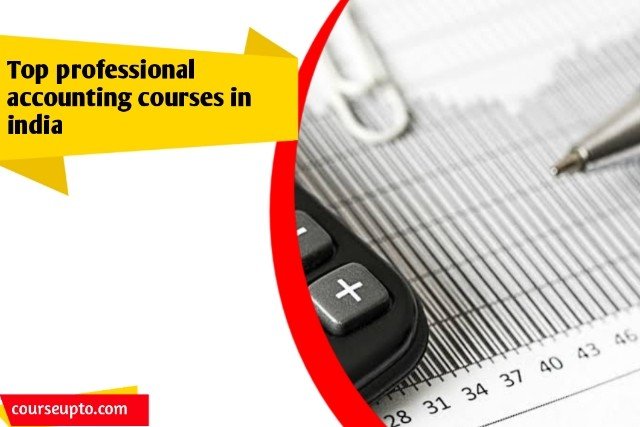Last Updated on 25 June 2024 by Abhishek Gupta
Are you looking for the Best Course For Accounting Students in India? Choosing the right courses can make or mar a career especially when it comes to the field of accounting, which is an ever-growing field.
Since the selected profession involves analytical and technical as well as ethical competency, a student has to choose an education program very wisely. Here are some of the most recommended courses that every accounting student should take if he/she intends to make it in the field.
Read More-
> 12 Best Course For Computer Science Students After 12th?
> Which course is best for PCB students without NEET?
Top 12 Accounting Courses in India?

Accounting can thus be described as an integral part of the business world as it involves a myriad of tasks from reporting to management. It will be important for students who have set their sights on this exciting field to enroll in the right course.
The perfect accounting course entails the teaching of theoretical knowledge, the acquisition of practical skills, and the understanding of the current market realities. Below is a breakdown of all these courses for accounting students who have intentions of establishing a strong and diverse career.
1. Financial Accounting: Best Course For Accounting Students in India
Financial Accounting is a prerequisite for any candidate who would like to pursue a career path of an accountant. This course focuses on the topic of accounting from the preparation of the financial statements to the interpretation and analysis of balance sheets, income statements, and cash flow statements.
Superb financial reporting knowledge is provided to students of this course to present the financial situation of a particular company to internal and external users. Having a strong knowledge of financial accounting allows aspirants to become auditors, financial analysts, or corporate accountants.
2. Managerial Accounting
Managerial Accounting relates to accounting information used within the organization in making organizational decisions. Some of the ideas are in the areas of budgeting, forecasting, cost behavior, and performance assessments.
Organizational behavior is important to those students who plan on having leadership responsibilities in their careers. It shows how related figures are used in ascertaining business operations that are useful for positions in corporate financial management and management constructive services.
3. Auditing:
Audit courses are aimed at presenting the major concepts, methods, and techniques in auditing such as financial statements and elements of risk analysis, the procedures of audit planning, and the legal and ethical requirements for auditors.
A review of auditing is relevant for students who want to be certified public accountants (CPAs) or internal auditors. This course enables the students to ensure that financial statements are valid, and the organizations meet the legal requirements.
4. Taxation: Top Accounting Course in India
Taxes are offered as courses whereby learners develop skills in analyzing laws and regulations, as well as tax returns for various individuals and companies.
Taxes are yet another crucial factor in the concept of accounting. It leads to careers in the areas of tax advising, legal compliance, and consulting. As with mergers and acquisitions, it remains a focused field for CPAs and lawyers in tax law.
5. Accounting Information Systems (AIS)
AIS courses are concerned with the application of IT in managing Accounting data. Such areas of coverage include computerized databases, systems analysis, and accounting information systems.
This leads to embracing AIS since it is imperative to know about changes occurring in technology affecting accounting practices. The focus of this course is on preparing its students for systems auditing, IT consultancy, and financial analysis for organizational positions
6. Ethics in Accounting
Ethics courses explain any ethical issue that an accountant can encounter. These are areas of practice that involve professionalism, ethical practice, and the means of making decisions that are ethical in areas of practice.
Ethics form the greatest foundation on which principles of accounting are built. Every accountant should take this course to guarantee that society maintains faith in the honesty of certified accountants.
7. Corporate Finance: Best Course For Accounting Students in India
The specific material covered in Corporate Finance lessons involves discussions of financial management concepts such as capital expenditure and investment appraisal.
Because this course relates most directly to careers such as financial planning, investment banking, and corporate treasury, this course would be of interest to students who are interested in these career paths. They are capable of making sound financial decisions with a view of expanding the businesses on their merit.
8. Advanced Financial Reporting
This course continues knowledge that is based on financial accounting starting with simple reporting problems and progressing with consolidated financial statements, foreign currency transactions, and financial instruments
Designed for the acca learners who seek to join the senior accounting cadre or areas of focus such as financial reporting and analysis, this advanced course is compulsory.
9. Cost Accounting: Top Accounting Courses in India
Cost Accounting is the study of cost, measuring it, analyzing, and keeping a record of the cost incurred in the production process. These areas can be further divided into cost sharing, stock, and supply, and measures of imposing costs.
This course is especially relevant for all students, who have a goal to work in manufacturing, logistics, or other industries where cost reduction is a major priority. They help to give requirements for increasing the efficiency of business operations and achieving higher revenues.
10. Forensic Accounting: Best Course For Accounting Students
Forensic Accounting deals with analysis that entails discovering and uncovering cases of fraud and embezzlement. This course looks at methods of identifying and investigating fraud, the nature and role of financial evidence, and the legal effects of fraud.
This is because there is a need for more accountants to specialize in areas such as financial reporting, auditing, and even fraud examination. This course will be beneficial to anyone who wishes to pursue investigations in an accounting firm, or police force, or act as a regulator.
11. Bachelor’s Degree in Accounting
A bachelor’s degree in accounting is the first university-level program most people undertake for them to become accountants. It usually lasts for four years to offer and when addressing these subjects, basic courses such as financial accounting, managerial accounting, taxation, auditing, and financial analysis may always feature. Key benefits include:
Foundation Building: This helps the student to understand the primary concepts and to gain an intuitive understanding of accounting and functional knowledge of accounting processes.
Career Readiness: Facilitates the student in getting the job prospects and the knowledge for entry-level jobs in the accounting and finance domain.
Certification Eligibility: Meets the educational requirements for certifications like Certified Public Accountant (CPA), Certified Management Accountant (CMA), etc.
12. Master’s Degree in Accounting (MAcc or MSA): Best Course For Accounting Students
Master of Accounting, better known as MAcc or MSA popularly stands for Master’s Degree in Accounting.
The next level will require a one to two-year advanced degree program: The Master’s degree in Accounting (MAcc or MSA) would be suitable for the individual with the next level of passion in this field.
Such a program usually spans 1-2 years and is meant to offer an intensive technical education in specific fields like forensic accounting, international accounting as well as advanced auditing. Advantages include:
Specialization: It makes it possible for students to pursue major specializations in a particular area of accounting.
Higher Earning Potential: That is why a qualified graduate level can receive a higher post at the company and improve its results.
Leadership Preparation: Position the learners to take up managerial and top leadership positions in their respective organizations or careers.
Read Also –
> Free online taxation courses in India
> Best Fashion designing course after 10th
Which course is best for accounting after the 12th?
1. Certified Public Accountant (CPA) Certification
Certified Public Accountant (CPA) Certification may also be important depending on the country of practice. CPA is an elevated level of professional certification in accounting that is widely recognized in the United States.
Some states also require their candidates to fulfill extra education requirements and, CPA experience before they can sit for and pass the Uniform CPA Examination. Key benefits of this certification include: Key benefits of this certification include:
Career Advancement: Gives access to the higher positions of the organizational hierarchy and positions that require specialization.
Credibility: Increases credibility and trustworthiness of professionals and experts.
Global Recognition: The structure allows it to be recognized and respected internationally, which will help facilitate an international career.
2. Chartered Financial Analyst (CFA) Program: Best Course For Accounting Students in India
is a professional credential offered by the Association of Chartered Financial Analysts to individuals.
Although, we see that the CFA program is not specifically for the professional titled as an accountant and yet it stands as one of the most recognized programs, especially in the fields of finance and investments.The
The CFA certification process entails taking and passing tough examinations with three levels and assembling adequate working experience. Key benefits include:
Comprehensive Finance Knowledge: It has links that touch diverse areas such as investment analysis and portfolio management, and a section that deals with ethics.
Versatile Application: Especially appropriate for the areas of investment banking, portfolio control, and financial analysis.
High Demand: A CFA charter is useful to bear in the current competitive market for financial markets and analysis professions.
3. Online Courses and Certifications
Flexibility is also seen in online learning education, with accounting students being able to complete courses and certifications online. Many online institutions such as Coursera, edX, and LinkedIn Learning offer courses from teachers and trainers in different fields of practice. Notable options include:
Accounting Analytics: Possible courses that require data analysis skills and are used in teaching accounting programs.
Blockchain and Cryptocurrency: Examining how the development of new technologies has affected this field of specialization.
Ethical Accounting: The strategic learning courses include those that address ethical principles of accounting and ethics in accounting.
4. Continuing Professional Education (CPE): Best Course For Accounting Students in India
Continuing Professional Education (CPE) is also important for practicing accountants to keep their certifications active and up to date based on any changes in the industry.
Regulatory Updates: Meeting requirements of the current accounting standards and legislations.
Technological Advances: Exposure to new accounting software and technology.
Professional Skills Development: The ability to develop soft skills such as leadership skills, communication skills, and negotiation skills.
Choosing the Right Course.
That is why it is crucial to determine what one aims to achieve in their career, what they enjoy learning, and what abilities they already possesses.
Assess Career Goals: Determine general and special goals in the career path and select a course that is relevant to the goals.
Research Programs: Research course offerings, professors, program approval, and placement assistance of similar programs.
Consider Flexibility: Decide if you require a full-time program, part-time program, or an online program according to your lifestyle.
Seek Guidance: Seek advice from academic and career counselors as well as experts in the field.
List of professional accounting courses in India
1. Account Control (CA):
I renewed with the Institute of Chartered Accountants of India (ICAI).
Structure: There are three exams: CA Foundation, CA Intermediate, and CA Final Exam.
Duration about 4-5 years.
Features: Provides multiple accounts for business accounting, business accounting, taxes, and other business finances. Proposals must be satisfactorily submitted to candidates for articles only before the issuance of the certificate.
2. Cost and Management Accountancy (CMA): List of professional accounting courses in India
Post Graduate Diploma in Industrial Cost Accounting from the Institute of Cost Accountants of India (ICAI).
Program: CMA has three levels and includes CMA Foundation, CMA Intermediate, and CMA Final.
Duration about 3-4 years.
Features: Cost estimates, performance estimates, and strategic management. Includes practical training requirements.
3. Company Secretary (CS):
Presented by Indian Institute of Company Secretaries (ICSI).
Structure: There are three company secretary exams: Company Secretary Foundation, Company Secretary Executive, and Company Secretary Professional.
Duration about 3-5 years.
The items are the basic rules governing the formation of a company, management, secretarial duties, and compliance. Includes required training and coaching.
4. Certified Management Accountant (CMA): List of professional accounting courses in India
Recommendations: IMA, USA has collaborated with several Indian universities and institutes to conduct this research. Design: Two-stage test.
The duration is usually 6-9 months.
Content includes financial and business accounting, economics, and management concepts. Relevant work experience is required.
5. Diploma in International Financial Reporting (DipIFR)
Offered by using: Chartered Accountancy, UK- Through Association of Chartered Certified Accountants (ACCA), available through distance education in Indian organizations.
Duration: Typically 3-6 months.
Features: Covers the topic of IFRS: International Financial Reporting Standards. Best suited to specialists working in companies that are exporting goods and services in various countries worldwide.
6. Financial Risk Manager (FRM): List of professional accounting courses in India
Offered by using: Fiduciary Capacity of Global Association and Risk Professional (GARP), USA.
Structure: Two-part exam.
Duration: Typically 1-2 years.
Features: Focuses on probability management, money chance, and risk assessment. A work revelation applicable to the rhyme is needed.
7. Complimentary certifications from the Indian Institute of Banking and Finance (IIBF)
Offered utilizing: Banking Institute of India (IIBF)
Popular Courses: CAIIB, JAIIB certified professional having had previous work experience in Bank.
Duration: Varies.
Features: Concerns itself largely with the actual banking, finance, and accounting functions of banks.
8. MBA in Finance
Offered using: Many institutions of higher learning in India and Indian business schools.
Duration: Typically 2 years.
Features: The insurance of vast aspects of a company’s economic field including the management, accounting, funding analysis, and business method. It often includes internships and simulations of possible work scenarios.
9. Post Graduate Diploma in Management (PGDM) in Finance
In the ICDE’s list of Degrees and Qualifications, an MBA in Finance is also known as a Post Graduate Diploma in Management (PGDM).
Offered through: Indian Institutes of Management, Indian Institute of Foreign Trade, many other autonomous institutions and business schools, etc.
Duration: Typically 2 years.
Features: Alike MBA in Finance with a strong concentration on professional understanding and business experience.
Also Read –
> How to start law study after 12th
> Free online cyber security courses with certificates
> Interior Design courses after 12th how many years
> Grow with Google free courses for Students
FAQ About Best Course For Accounting Course Students in India
To become an accountant in India, you commonly need to finish a relevant bachelor’s diploma, which includes a Bachelor of Commerce (B.Com) with a first-rate in accounting. Professional qualifications including Chartered Accountancy (CA), Cost and Management Accountant (CMA), or Company Secretary (CS) also tremendously appeared and often wished for superior professional opportunities in accountancy and finance
Career possibilities upon completion of the cost accounting (CMA) certification consist of roles as a price accountant, management accountant, economic analyst, inner auditor, and audit CMAs are required in manufacturing, offerings, consulting firms, and authorities companies.
Yes, many accounting disciplines offer a simple curriculum that is suitable for a full-time task. CPA, CMA, and CFA studies may be pursued through element-time courses, online guides, and self-study modules. Additionally, a few packages may also provide nighttime or weekend instructions depending on your schedule.
The Certified Public Accountant (CPA) qualification is globally identified and makes a specialty of accounting and auditing requirements within the United States particularly the Institute of Chartered Accountants of India (ICAI) Chartered Accountant (CA) qualification is the maximum fairly appeared in India. While each has a reputation, CPA is extra suitable for those seeking global opportunities, whilst CA is greater tailor-made to the Indian surroundings.
Yes, These encompass diplomas and certifications in areas like International Financial Reporting Standards (IFRS), Financial Risk Management (FRM), and specialized publications presented by way of the Indian Institute of Banking and Finance (IIBF).
Conclusion:
Therefore, the selection of appropriate courses is a significant process for accounting education and career development for the students. An understanding of financial accounting, managerial accounting, and specialized courses such as auditing taxation, and forensic accounting gives the educational backbone. Through integration of learning with the courses taken, the students can prepare for the accounting world that is considered today.










